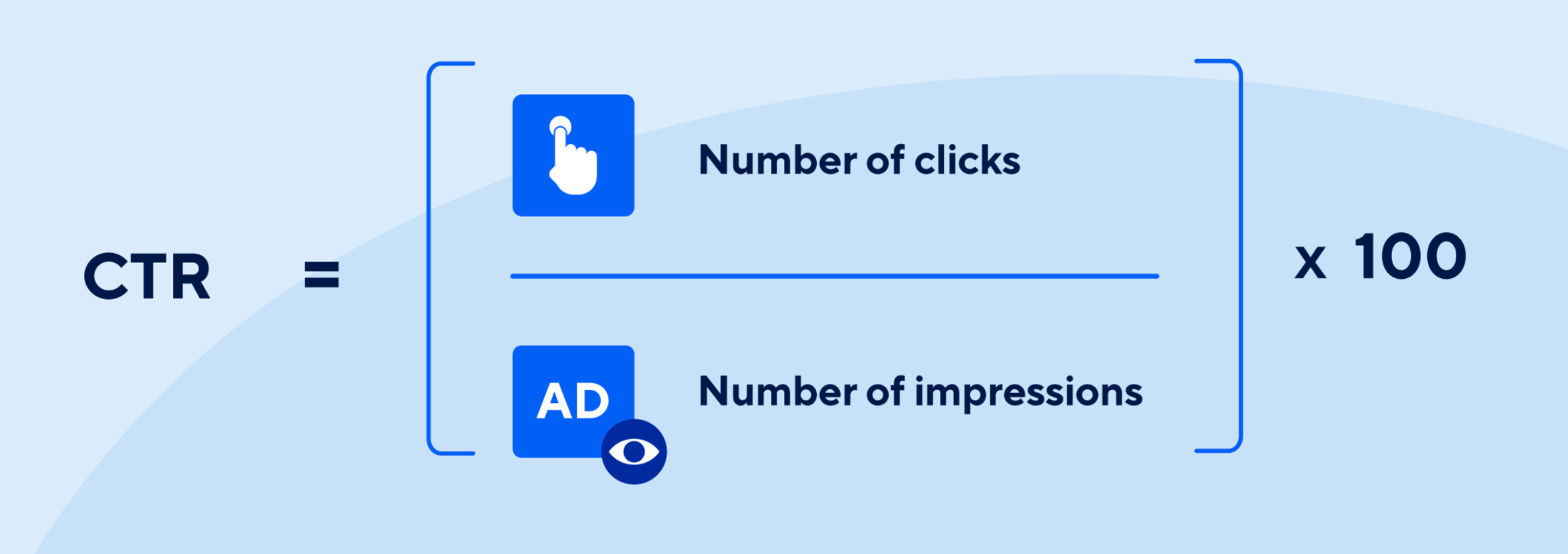
In eCommerce and digital marketing, getting your website to appear on the first page of search results is only half the battle. The next, and arguably more important, step is getting people to click on your link instead of your competitors. This is where Click-Through Rate (CTR) comes in.
Among the many factors influencing CTR, customer reviews stand out as one of the most impactful. Reviews don’t just build credibility; they also act as social proof that search engines can display directly in results through rich snippets like star ratings and review counts. A store with positive reviews often attracts significantly more clicks than one without them, even if both rank in similar positions.
This article explores how reviews shape CTR, why they matter for SEO and conversions, and how you can strategically use them to your advantage.
CTR, or Click-Through Rate, measures the percentage of people who click on your website’s link after seeing it in search results. It’s calculated as:
CTR = (Number of Clicks ÷ Number of Impressions) × 100

For example, if your product page appears in Google search results 1,000 times and 100 people click on it, your CTR is 10%.
CTR is considered an important factor for enhancing SEO results and increasing sales as:
This makes optimizing CTR essential for both SEO and sales. Reviews are one of the most effective levers for boosting it.
When shoppers scan search results, they have limited time to decide where to click. While titles and descriptions play a role, reviews often act as the final nudge that determines whether your link gets chosen over another. They combine visual appeal, credibility, and relevance, all of which directly influence CTR. Let’s explore the reasons why reviews matter for CTR.
Search results are usually a wall of text: blue titles, gray meta descriptions, and green URLs. Reviews break this monotony by adding bright yellow star ratings and review counts that catch the eye immediately.
Even a listing in the second or third spot can sometimes outperform the first if it shows rich review snippets. That visual trust signal is powerful in drawing attention away from competitors.
Consumers trust other consumers more than brands themselves. Reviews act as social validation, telling searchers:
This level of reassurance can make the difference between a click and a scroll-past.
Search engines often pull snippets of review text into search results. These can include product features or customer experiences, showing potential buyers that your product matches their intent.
For example, a user searching for “eco-friendly water bottles” may see a review snippet like: “Love how sustainable and BPA-free this bottle is.” This match between query and review text makes the listing more relevant, encouraging clicks.
When two stores compete for the same keyword, reviews often act as the tie-breaker. A product with hundreds of positive reviews will almost always attract more clicks than one with no reviews.
This competitive advantage is especially valuable for smaller stores trying to stand out against larger, more established brands.
Boosting CTR with reviews isn’t automatic, but it requires strategy. Here are some best practices explained in detail:
Structured data is what makes reviews show up in search results. Without schema, even if your product has hundreds of reviews, Google may not display them. By implementing a review schema, you enable star ratings, review counts, and snippets to appear right under your listing.
For non-technical store owners, this can sound complex, but review apps like Ryviu handle it automatically. With schema in place, you increase your chance of standing out in crowded SERPs.
A common mistake is only gathering reviews at product launch. CTR benefits most when reviews are fresh and continuous, showing that your store is active and trusted.
Ways to encourage authentic reviews:
The more consistent your review flow, the stronger your CTR performance in the long run.
Search engines sometimes pull keywords from reviews into snippets. Encouraging customers to mention product details (e.g., “lightweight,” “waterproof,” “eco-friendly”) can increase relevance for searches.
For instance, if reviews for your hiking boots mention “waterproof” repeatedly, your listing is more likely to appear attractive to someone searching “best waterproof hiking boots.” That alignment can significantly lift CTR.
Consumers often trust products with many reviews over those with just a handful, even if the smaller set has a perfect rating. Displaying “4.6/5 stars from 2,300 reviews” is more persuasive than “5/5 stars from 5 reviews.”
A higher volume shows popularity, while a solid star rating shows quality—together, they create a compelling reason to click.
Searchers don’t just look at ratings; they also value how brands engage with customers. A brand that responds to reviews, especially negative ones, appears more transparent and trustworthy.
This trust can spill over into search behavior. If potential buyers see signs of active engagement, they’re more likely to trust the brand and click its link over competitors.
Don’t limit reviews to product pages. Display them on your homepage, landing pages, and even in ad copy. When customers see consistent social proof across multiple channels, they’re more likely to trust your brand and click your search results.
By making reviews a central part of your brand identity, you reinforce the credibility that drives CTR.
Collecting, displaying, and optimizing reviews manually can be overwhelming for store owners. Between handling customer feedback, ensuring structured data is implemented correctly, and showcasing reviews in an attractive way, the process can quickly become time-consuming. This is where the Ryviu app becomes invaluable. Designed for Shopify and WooCommerce stores, Ryviu streamlines every aspect of review management so that reviews not only look good on your site but also work behind the scenes to improve your visibility and click-through rate (CTR) in search results.

Here’s how Ryviu directly helps your store stand out and attract more clicks:
One of the biggest hurdles for store owners is implementing structured data correctly. Without schema, Google may not display star ratings or review counts in search results, even if your product has hundreds of reviews. Ryviu solves this by allowing you to embed Review Schema Markup into your product pages. This ensures that search engines can pick up your reviews and display them as rich snippets with star ratings, making your listing visually appealing and far more likely to get clicked.
Gathering reviews takes time, especially for new stores. With Ryviu, you can import reviews directly from platforms like AliExpress and Amazon, giving your store an immediate base of authentic social proof. Beyond imports, Ryviu also enables you to collect fresh reviews from your actual customers through post-purchase requests. This dual approach ensures your store has a steady flow of feedback, which strengthens both your credibility and CTR.

Search engines often pull snippets of review text into SERPs. Reviews containing product-specific keywords can make your listing look more relevant to a user’s search query. With Ryviu, customers are encouraged to leave detailed, keyword-rich reviews about product features, usability, or benefits. For example, instead of a vague “Great shoes,” reviews might highlight “Lightweight running shoes with excellent grip.” These natural keywords boost snippet relevance, helping your listing align more closely with what shoppers are searching for, and increasing the chances they’ll click.
Reviews aren’t only useful on product pages. Ryviu provides customizable widgets that allow you to display reviews in different layouts across your store, including your homepage, collection pages, or even landing pages. By making reviews visible throughout the buyer journey, you reinforce trust and consistency. This consistency ensures that when a shopper sees your listing in Google with star ratings, they’ll find the same trust signals echoed on your site, reducing bounce rates and strengthening CTR’s downstream impact on conversions.
Reviews are most powerful when they feel alive, not static. With Ryviu, you can easily manage, respond to, and highlight reviews from within your dashboard. Replying to customer feedback shows transparency and care, which enhances your brand’s reputation. Even in cases of negative reviews, a thoughtful response can reassure both Google and potential buyers that your business is responsive and trustworthy. This builds credibility and encourages more users to click your listing over a competitor who looks unresponsive or inactive.

By handling both the technical and customer-facing sides of reviews, Ryviu gives you a complete solution: reviews that are search-engine friendly and conversion-focused. Whether you’re a new store trying to establish trust or an established brand looking to increase your CTR, Ryviu provides the tools to make reviews work harder for your business.
Conclusion
Reviews are no longer just an element of post-purchase engagement, they’re a critical factor in how customers discover and choose your store. From enhancing visibility with star ratings to building trust through authentic social proof, reviews can increase CTR by double digits and give your brand a decisive edge over competitors.
By implementing structured data, encouraging genuine feedback, and using apps like Ryviu to streamline review management, you can turn reviews into a powerful traffic driver. Ranking high on Google gets you seen, but reviews are what get you clicked.


This article explores why variant-level reviews matter, the challenges merchants face, and the best practices for implementing them effectively without harming performance or user experience.
Shopify app stack optimization is the process of reviewing, refining, and streamlining the apps installed on your store so each one delivers clear value without compromising speed. By focusing on intentional app selection and ongoing optimization, merchants can create faster, more reliable shopping experiences that scale smoothly as the business grows.